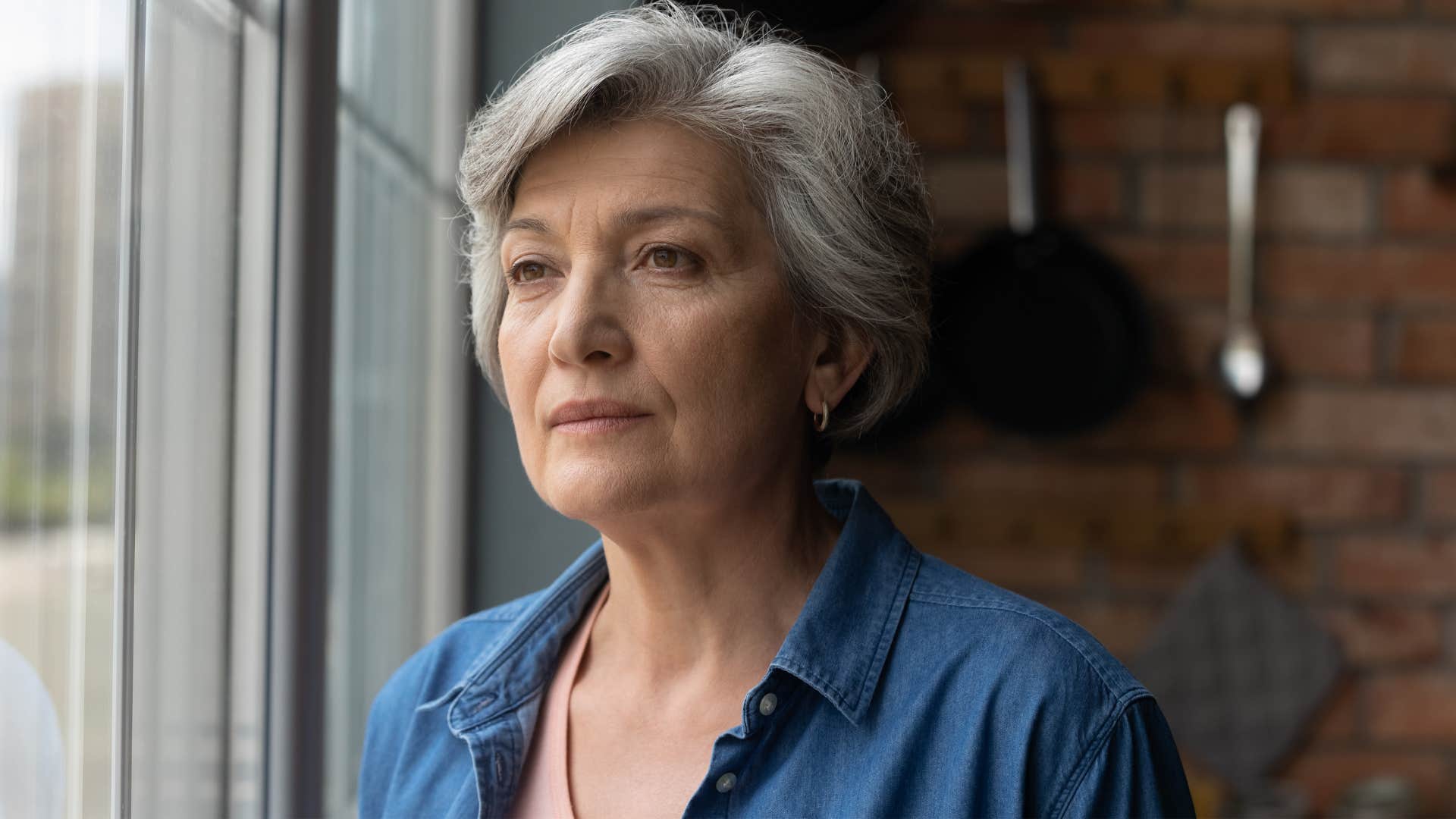Parents Who Do These 10 Things Are Enabling Their Adult Child's Bad Behavior
Sometimes, taking a step back is the best thing we can do for our adult children.
 PLotulitStocker | Shutterstock
PLotulitStocker | Shutterstock Navigating any kind of adult family relationship can be difficult, whether you're learning how to look past hurtful childhood experiences as an adult child or figuring out how to navigate parenting a child out of the house. There's no "right and wrong" way to figure out these tough family dynamics, but there are certain behaviors that can taint a relationship, putting everyone's emotional health at risk.
According to psychologist Jeffrey Bernstein, there are certain behaviors parents who are enabling their adult child's bad behavior do that are subtly overlooked as a well-natured support. They may feel like they're doing the right thing, when truly they're only hindering their child's personal growth and development into adulthood.
Here are 10 things parents do that are enabling their adult child's bad behavior
1. They avoid their own unresolved traumas
 Fizkes | Shutterstock.com
Fizkes | Shutterstock.com
According to the Hanley Foundation, many parents who toxically enable their adult children are often stuck in subtly toxic behaviors manifesting from their unresolved traumas. Stuck in a "hero mentality" or other people-pleasing tendencies, they prioritize their children's perceived comfort over their growth or true support.
By making themselves constantly available and always "picking up the pieces" when they're struggling, they not only take away opportunities for their adult children to learn self-sufficiency, they also sacrifice their own emotional health and healing. Even when they're actively being taken advantage of, they're willing to enable it by setting their own feelings aside to keep the peace in their relationships.
2. They try to 'save them' from life's challenges
 Dragana Gordic | Shutterstock.com
Dragana Gordic | Shutterstock.com
Enabling parents of adult children aren't always consciously taken advantage of by their kids; in fact, a great deal of their behaviors are often motivated by an intrinsic need to maintain an all-encompassing relationship with their families. Sometimes, that desire comes from having unmet needs themselves. Perhaps they weren't protected or supported in their own childhood and that now manifests as an innate need to "do better" for their own kids.
To an extent, there's a sense of "overprotection," which researchers from Pew Research Center argue is becoming more prevalent today, in parents with young children that can excuse them from "enabling" labels. However once their kids reach adulthood, that protection can become a hindrance.
By shielding adult children from the struggles of life — whether financial, social, or otherwise — their kids learn to completely rely on them to live their lives, rather than developing their own emotional intelligence, complex thinking, and coping skills.
3. They constantly call and text their kids
 Prostock-studio | Shutterstock.com
Prostock-studio | Shutterstock.com
A New York Times article on parental involvement by Claire Cain Miller suggests that "most parents" of adult children today are increasingly more involved in their kids' lives than that of a few decades ago, but not necessarily to a fault. There's a balance that's essential to cultivate — a "give-and-take" — that sets these healthier relationships apart from toxic enabling ones.
Enabling parents are, either knowingly or not, interfering with their adult children's lives to the point where it hinders their own personal development and independence, removing the autonomy and challenge from adulthood by taking on that responsibility themselves. They are constantly in contact with their kids, trying to investigate their struggles and helping them to navigate through day-to-day life, in a misguidedly unhelpful way.
It's not healthy for a parent to live through their children, and while texting and calling them frequently isn't necessarily a sign of that, it can be a trait of parents enabling their adult child's bad behavior.
4. They frequently give unprompted advice
 Fizkes | Shutterstock.com
Fizkes | Shutterstock.com
Unprompted advice often sparks resentful feelings in a relationship, especially between parents and their adult children. At some point, parents have to take a step back, let their children fight their own battles, and give them a chance to learn true independence, whether it's comfortable or not.
When enabling parents constantly dish out unprompted advice, they're taking away little opportunities for their adult children to embody their own complex thinking and hone in their decision-making skills.
5. They continuously provide financial support
 Maria Sbytova | Shutterstock.com
Maria Sbytova | Shutterstock.com
Even in today's economic climate, where more adult children are living with their parents out of necessity than ever, according to a Pew Research Center study, there are healthy ways to navigate a coexisting relationship — socially, emotionally, and financially.
According to parent coach and psychologist Jeffrey Bernstein Ph.D., when adult children still contribute to their parents, whether that be a rent payment, shared household responsibilities, or simple quality time, they feel a sense of accomplishment and accountability that combats resentment.
Similarly, when a parent sets boundaries for support with their adult children, they're able to ensure they're not sacrificing their own stability or their adult child's independence and responsibility by overlooking bad or immature behavior.
Enabling parents tend to disregard those protections, dishing out emergency funds and financial support whenever their adult children seem to need it. And they do so even if the contrary would give them the chance to learn a sense of healthy independence and accountability.
6. They shift blame away from their kids
 tairome | Shutterstock.com
tairome | Shutterstock.com
According to psychology expert Peg Streep, blame-shifting isn't just harmful to parent-child relationships when it's utilized within their connection — it's just as toxic when it's used to "protect" a family member. When an enabling parent makes excuses for their child and blames other people in their life for their own problems, it instills a sense of dependency in them.
Not only does it keep them from taking accountability for their own bad behavior and actions, it prevents them from learning independence and seeing the bigger picture as they navigate their life struggles and situations.
7. They dismiss their own needs
 Julia Zavalishina | Shutterstock.com
Julia Zavalishina | Shutterstock.com
Parents who invest all their time and energy into showing up for their adult children, even to the point where it becomes a codependent hindrance to their well-being, often have no extra space to take care of themselves. From maintaining their personal health, to investing in their social circles and support systems, to protecting their emotional and mental health, they're worn thin protecting their kids from adulthood.
At the end of the day, when their adult children don't need them for anything, they're lonely. They haven't enriched their other relationships, they're exhausted from carrying their children's burdens, and now they have no true interests or motivations to personally grow their own lives.
8. They ignore their child's harmful or dangerous habits
 Voronaman | Shutterstock.com
Voronaman | Shutterstock.com
Unfortunately, as many enabling parents spark codependency in their family dynamics, they're also forced to manage harmful habits and dangerous tendencies in their children's adult lives. According to a report from Mission Harbor Behavioral Health, these parents often struggle to separate themselves from their child's recovery in a healthy way.
They may continue financially supporting an adult child investing in unhealthy habits, and sometimes even encourage them to seek support in unhealthy vices to promote comfort in their lives. With better boundaries and by taking a true step back, these enabling parents can ensure they're protecting both their own emotional health and their children's health as well.
9. They make excuses and fail to re-assert their boundaries
 Fizkes | Shutterstock.com
Fizkes | Shutterstock.com
Many enabling parents aren't blind to their toxic tendencies of being overly forgiving and all-encompassing in their adult child's life, but don't have the confidence or emotional security to truly enforce their boundaries.
They may be afraid of losing their children, taking on the burden of shifting the family dynamic, or even anxious about coping with the inevitable feelings of guilt and blame that many parents experience for simply looking after themselves. With all of these anxieties, they continue putting themselves at risk to help their kids, hoping that eventually they'll learn, grow up, or pave their own path in adulthood.
10. They're overly critical of their children's other relationships
 Srdjan Randjelovic | Shutterstock.com
Srdjan Randjelovic | Shutterstock.com
Often unknowingly resentful of the burdens they carry for their children's comfort in adulthood, these enabling parents experience intense emotions and need somewhere to cope with them. Manifesting as outward criticism, these emotions can be partially addressed and vented through their child's other relationships — whether they be friends, partners, and peers in their children's lives.
Sometimes misunderstood as "overbearing" instead of enabling, these kinds of parents tend to be overprotective of their adult children to a fault, losing sight of the kind of independence and happiness they're actually hoping to spark in their kids' lives.
Zayda Slabbekoorn is a staff writer with a bachelor's degree in social relations & policy and gender studies who focuses on psychology, relationships, self-help, and human interest stories.

